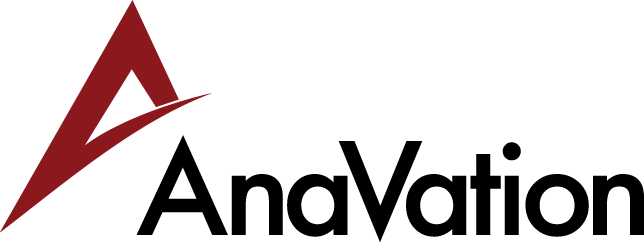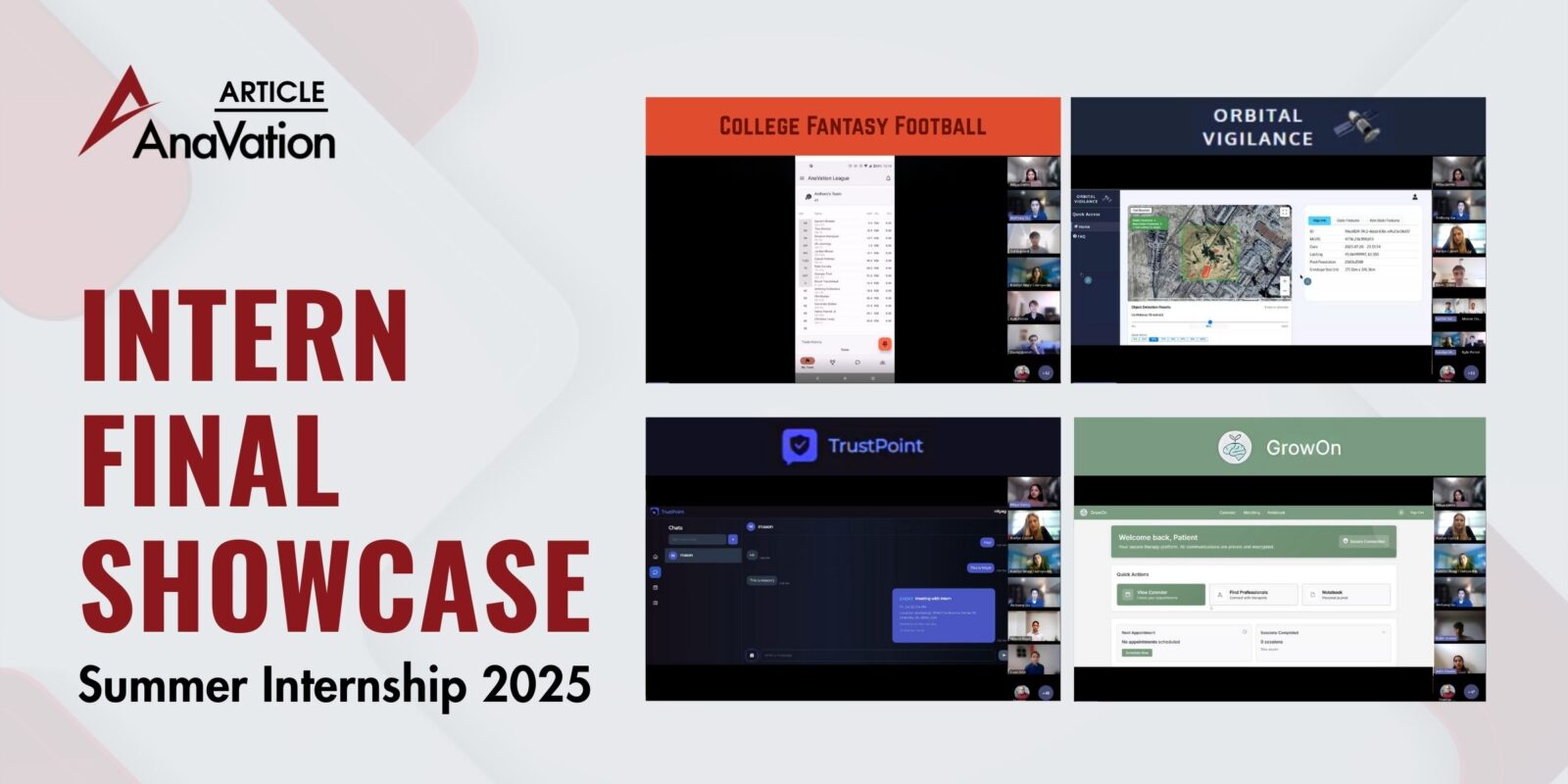This summer, AnaVation welcomed 13 bright and motivated interns to work alongside our team on exciting, real-world projects. Recently, our interns wrapped up their internship experience with a final showcase of their projects and demos. After a couple of months of learning and hands-on development, our four talented intern teams took ideas from concept to execution – demonstrating innovation, adaptability, and strong collaboration. The showcase highlighted not just was built, but what was learned – about teamwork, problem-solving, and applying new technologies. Here’s a closer look at the impressive work each team accomplished:
College Fantasy Football – Anthony G, Danny B, and Sid K
This team developed a fantasy football Android app designed specifically for college football. Inspired by existing NFL apps, the platform includes league creation (public/private), live drafts, season tracking, weekly matchups, player stats, team management tools, a live chat feature, and a notification system. This was a complex project with many moving parts, and the team rose to the challenge with speed and adaptability. Despite having limited experience with many of the tools, the team quickly ramped up an impressive array of technologies to bring their vision to life. They gained experience in designing and integrating frontend systems such as React Native, Expo, and custom WebSocket clients. On the backend, they used AWS AppSync, Lambda, Step Functions, and MongoDB.
Along the way, they practiced Scrum and Agile development, wrote clean and testable code, and strengthened their collaboration through daily standups. They also learned the importance of clear communication within a team, improving their ability to articulate ideas through code reviews and ticketing in Jira. Looking ahead, the team hopes to enhance the platform by integrating live season data for real-time play, expanding to iOS and web platforms, refining the user interface, and introducing more social features to increase community engagement.
Orbital Vigilance – Kevin T, Sachin S, Kyle P, and Katelyn C
Orbital Vigilance is a web application that processes satellite imagery and enables analysts to search for and visualize images in time-sensitive situations. The application can highlight key points of interest such as education buildings, hospitals, police stations, aerodromes, military buildings, and hazardous areas, given the image’s latitude and longitude location. It uses OpenStreetMap (OSM) API for static features and the Lightweight Edge-Gaussian Driven Network (LEGNet) model to detect non-static, high-resolution image elements. It collects and stores image metadata and object geometry in a Postgre database, allowing for advanced geospatial analysis.
This team used frontend technologies, including React SPA and AWS Cognito. Meanwhile, their backend structure utilized Flask API, OverPass API, AWS Lambda, S3, SQS, PostGIS, and Elastic Beanstalk. Faced with a condensed timeline and initial limitations on AWS access, the team adopted Agile planning techniques and began development locally before seamlessly migrating to the cloud. Throughout the process, they cycled through roles across the full tech stack—user interface, API design, machine learning, database, and infrastructure—strengthening collaboration and cross-functional skill development. In the future, the team hopes to implement semantic natural language search using multimodal large language models and deploy a complete, agency-ready solution that can be used behind government firewalls via Elastic Beanstalk or virtual machines.
TrustPoint – Nitya G, Mason D, and Evan H
TrustPoint is a web and mobile application that enables users to safely coordinate in-person meetings through anonymous messaging, passcode validation, mobile location tracking, and required emergency contact inputs. A calendar and map are integrated for users to keep track of future meetings. In addition, there is an admin dashboard for user monitoring and abuse reporting prevention.
This team built this platform using React, Amazon Location Services API, React Native, Firebase Cloud Messaging, and Google Maps API for the frontend. On the other hand, AWS Amplify, Cognito, AppSync, S3, and DynamoDB were used for the backend. The team learned valuable lessons throughout the development process, like how to evaluate multiple approaches to a problem and the importance of understanding the problem to solve before jumping into implementation. They emphasized the need for clean, maintainable code, and found sprint-based planning and daily standups were essential to consistent progress. As the application evolves, the team plans to incorporate features such as group chats, as it only currently supports peer-to-peer interactions, geofencing to notify users when they’re within a radius of the meeting location, and pre-defined emergency locations (i.e., police stations) to resort to for safety.
AVGrowOn – Aditi S, Kabir G, Roald S
AVGrowOn provides a safe and secure platform for individuals with mental health concerns to connect with clinicians in an anonymous, risk-free way through either messaging or video/voice call. The web application is intended to be a government-worker-oriented therapy service for individuals in high-stress environments. The platform was designed with privacy at its core: clinicians are verified through certifications, users remain anonymous unless they choose to disclose their identity, and all communications are encrypted using AES-256 encryption.
To ensure platform integrity and trust, the application includes the ability for clinicians to report abuse when necessary and vice versa for users. The team took security a step further by implementing AWS PrivateLink to route all frontend-to-backend traffic over private VPS connections and protected their application with a firewall to guard against malicious traffic and threats. This team harnessed HTML, TS, CSS, React, S3, and Cloudfront for the frontend and leveraged Python, DynamoDB, Pydantic, Bcrypt, JWT, and FastAPI in the backend. Overall, this team learned the importance of building a solid technical foundation and strong communication during the process to keep the team on track. The team has future goals to integrate additional CyberBioSecurity features and tailor the platform for secure deployment in government environments to help provide private therapy support specifically for military and veteran personnel.
AnaVation is incredibly proud of the motivation, ingenuity, and technical excellence our interns demonstrated this summer! They took on real-world problems, learned new technologies quickly, and built impactful solutions—all in a short time frame. Their projects reflected the kind of innovation, collaboration, and growth we value at AnaVation.





